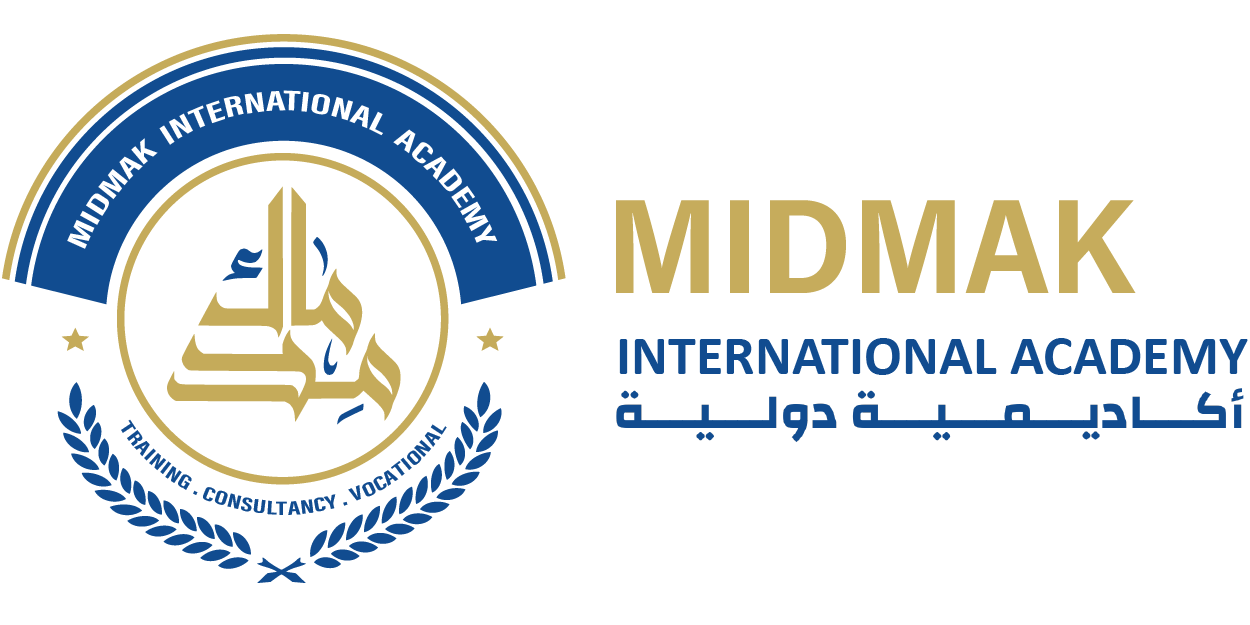Environmental and Agricultural Competency Development Sector
Sector encoding: 016
Overview:
In light of the growing global emphasis on sustainability and the increasing demand for environmentally responsible agricultural practices, the need to develop specialized competencies in the environmental and agricultural sectors has become essential. These sectors play a critical role in ensuring food security, conserving natural resources, and promoting sustainable development. The success of these sectors depends on the ability of professionals to adopt innovative practices, apply modern technologies, and adhere to international environmental standards.
Midmak International Academy offers comprehensive training programs in environmental and agricultural competency development, designed to equip professionals with the knowledge and skills necessary to address the challenges of today’s global environment. The programs focus on enhancing participants’ abilities to manage agricultural projects effectively, adopt sustainable practices, and implement environmental protection measures in line with global best practices.
Target Audience:
– Agricultural professionals and farmers:
- Farmers, agricultural engineers, and technicians seeking to improve their skills in sustainable farming practices, crop management, and the use of modern agricultural technologies.
- Farm managers aiming to enhance their knowledge of efficient resource management, including water and soil conservation.
– Environmental managers and specialists:
- Environmental scientists, conservationists, and professionals involved in natural resource management, ecosystem restoration, and environmental impact assessments.
- Environmental policy makers and sustainability officers looking to develop strategies for mitigating climate change and promoting biodiversity.
– Government and NGO workers:
- Employees in environmental and agricultural agencies responsible for developing policies and implementing programs that promote sustainable agricultural practices and environmental conservation.
- Non-governmental organizations (NGOs) focused on rural development, food security, and climate action.
– Technology and innovation enthusiasts:
- Technologists and researchers interested in applying modern technologies such as artificial intelligence, drones, and the Internet of Things (IoT) in precision agriculture and environmental monitoring.
- Innovators looking to create solutions that promote sustainable development and address environmental challenges.
General Objectives:
- Promoting sustainable agriculture: Empowering professionals to adopt sustainable agricultural practices that reduce environmental impact and enhance food production efficiency.
- Enhancing resource management: Training participants on the effective management of natural resources, including water, soil, and energy, to promote sustainability in agricultural practices.
- Encouraging the use of modern technologies: Teaching the application of cutting-edge technologies such as smart farming tools, drones, and IoT for precision agriculture and environmental monitoring.
- Promoting environmental conservation: Training professionals on the importance of conserving biodiversity, protecting ecosystems, and mitigating the effects of climate change through responsible agricultural and environmental practices.
- Strengthening food security: Providing knowledge and skills to professionals to increase agricultural productivity while ensuring long-term sustainability and food security for communities.
- Building capacity in climate change adaptation: Teaching professionals how to develop and implement strategies that enable agricultural systems to adapt to changing climatic conditions.
- Improving waste management and recycling: Training participants in the principles of waste reduction, composting, and recycling, especially in agricultural and rural contexts.
Training Courses:
– Sustainable Farming Practices:
- Organic Farming: Comprehensive training on organic farming methods that promote soil health, reduce chemical inputs, and enhance crop diversity.
- Agroecology: Teaching the principles of agroecology to integrate ecological practices into farming systems, enhancing sustainability.
- Precision Agriculture: Training on the use of technologies such as GPS, drones, and IoT to optimize farming practices and increase efficiency.
- Water Management in Agriculture: A course focused on water conservation techniques, irrigation management, and drought mitigation strategies.
– Environmental Management:
- Natural Resource Management: A course on managing natural resources, including water, forests, and soil, with an emphasis on sustainability.
- Ecosystem Restoration: Teaching techniques for restoring degraded ecosystems and promoting biodiversity.
- Climate Change Mitigation and Adaptation: Courses on strategies for reducing greenhouse gas emissions and adapting agricultural practices to changing climate patterns.
- Environmental Impact Assessments: Training on how to conduct assessments that measure the environmental impact of agricultural projects and development activities.
– Smart Agriculture and Innovation:
- IoT and Drones in Agriculture: Teaching how to use drones, sensors, and IoT devices for real-time monitoring and management of agricultural activities.
- Artificial Intelligence in Agriculture: A course focused on the application of AI in crop monitoring, pest control, and optimizing resource use.
- Sustainable Energy for Agriculture: Training on the use of renewable energy sources such as solar and wind power in agricultural operations.
– Agricultural Waste Management:
- Composting and Organic Waste Management: Teaching the principles of composting and waste reduction in agricultural settings.
- Biogas Production from Agricultural Waste: Training on converting agricultural waste into biogas for energy production and environmental protection.
– Environmental Policy and Sustainability:
- Sustainable Development Goals (SDGs) in Agriculture: A course on how agricultural practices can align with the UN’s Sustainable Development Goals to promote environmental sustainability and food security.
- Policy Development for Environmental Protection: Teaching how to create and implement policies that promote environmental conservation and sustainable agriculture.
These training programs aim to empower professionals in the environmental and agricultural sectors to achieve higher levels of expertise and excellence. Through a focus on sustainability, innovation, and the adoption of modern technologies, Midmak International Academy is preparing a workforce capable of addressing global environmental challenges and contributing to the sustainable development of the agricultural sector.

